
Lethbridge College researchers studying ways to simplify potato quality testing
LETHBRIDGE, AB – A research project out of Lethbridge College strives to simplify the way potato quality is tested. Currently, the best way to find out if a potato is good enough to go to market is to cut it open and look to see if it has any defects. Officials say that’s a process that takes time and is destructive.
The work out of Lethbridge College aims to use cutting-edge near-infrared (NIR) hyperspectral imaging technology to test potato quality more quickly and in a way that does not destroy good product. The major quality issues that plague potatoes are internal defects, greening, specific gravity (a measurement of the solids or starch content relative to the amount of water contained in a potato) and sugar content.
Dr. Chandra Singh, Senior Research Chair in Agricultural Engineering and Technology at Lethbridge College, is leading the three-year, $523,300 project. It includes more than $400,000 in funding from Results Driven Agriculture Research (RDAR) and Alberta Innovates.
Singh said the cost for the technology used in the project has gone down, so, “We are at a point where this technology can be implemented on a large-scale.”


